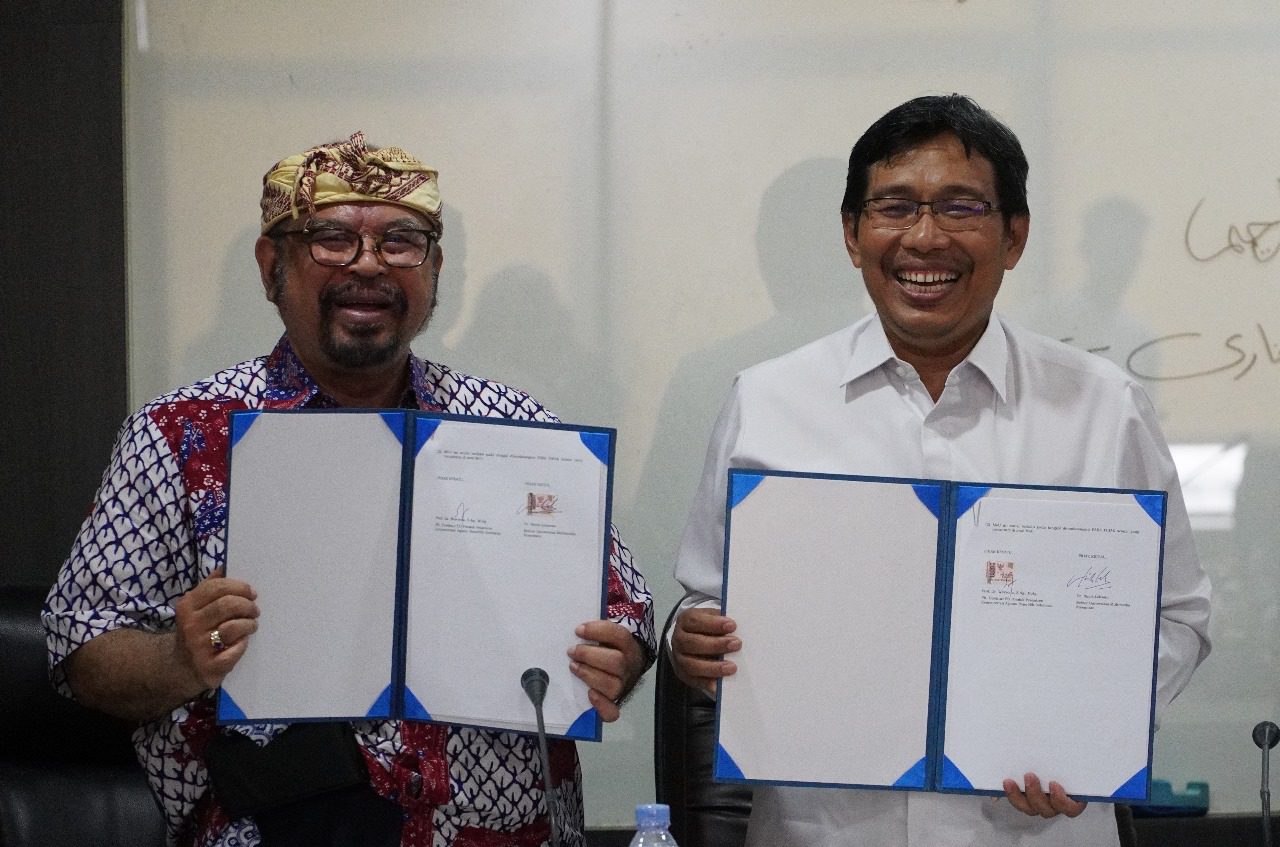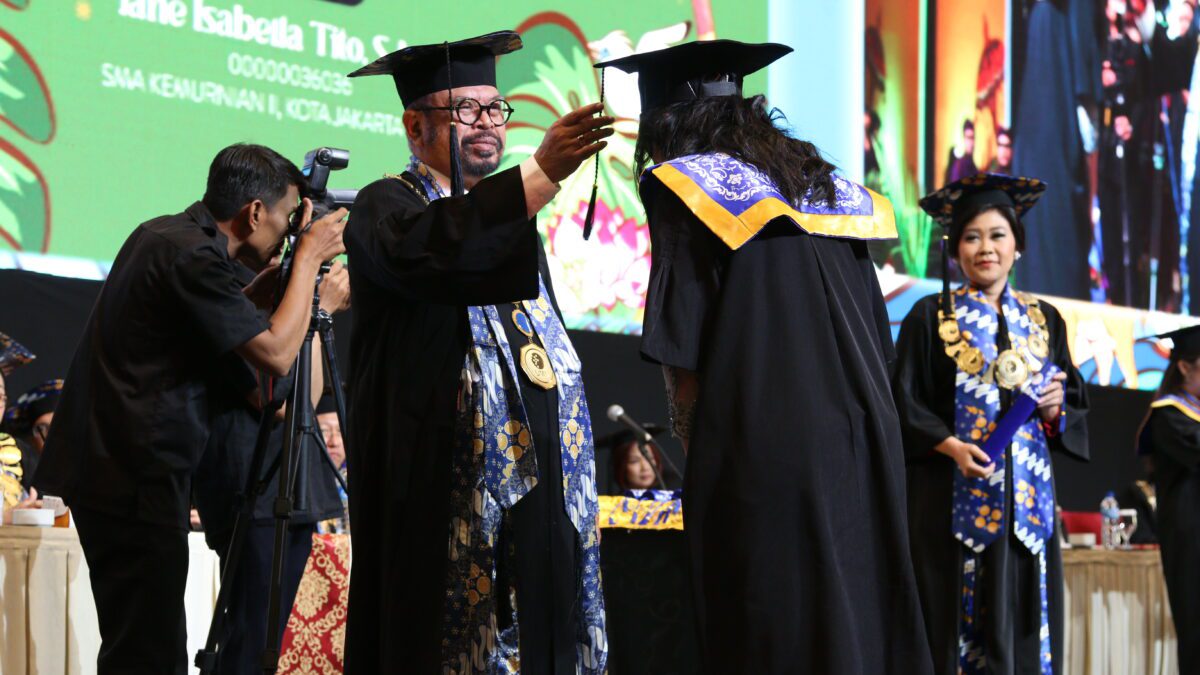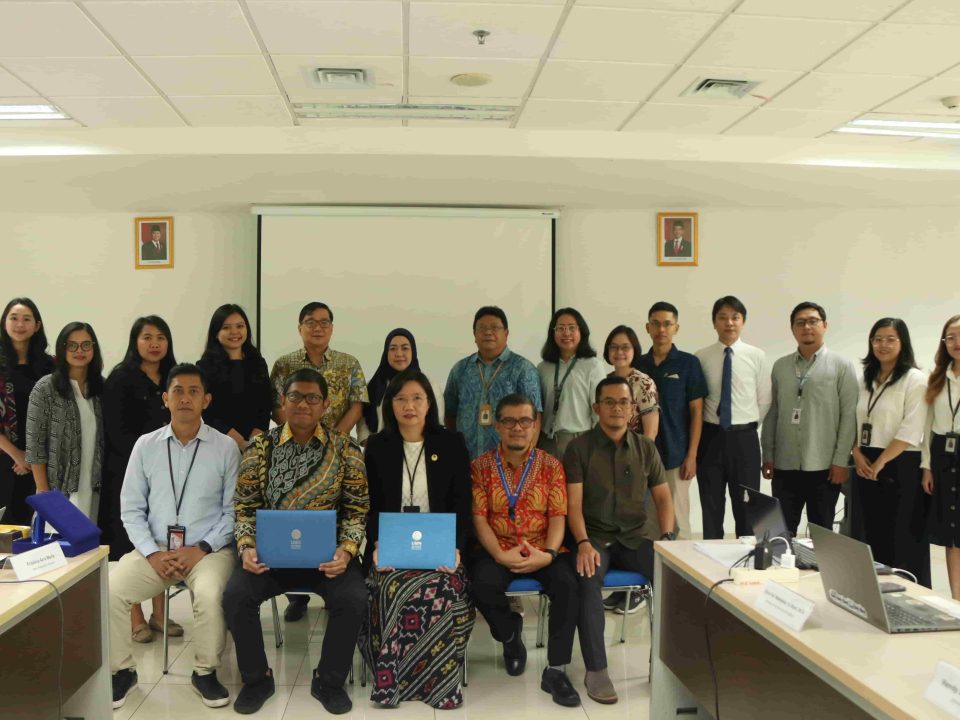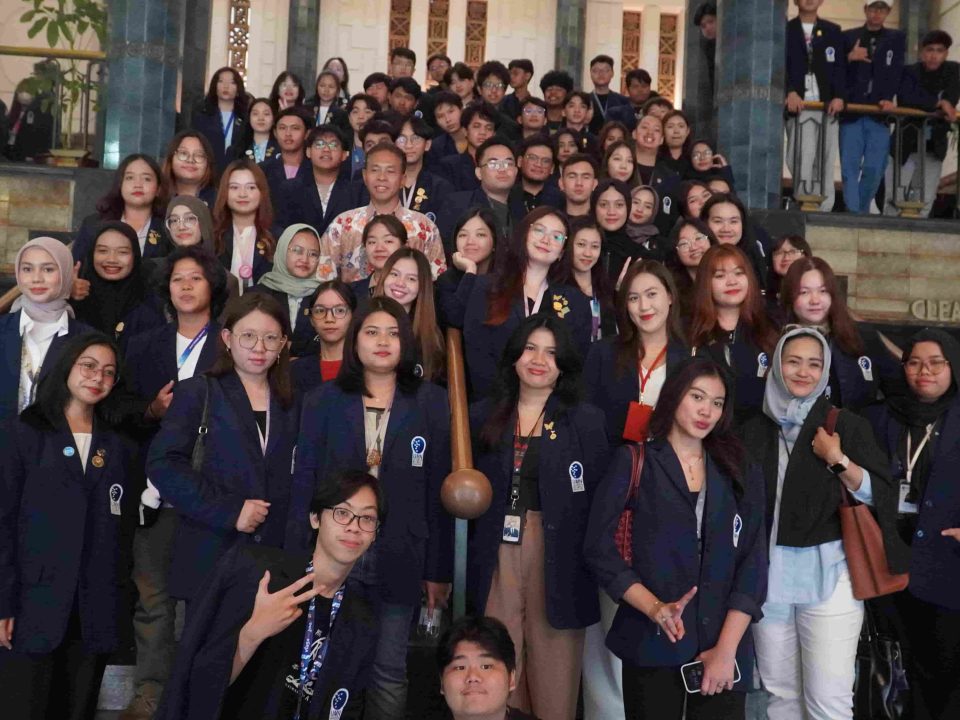
UMN Rises in Ranking as UI GreenMetric 2023’s Most Sustainable Campus
January 9, 2024
Opening Space for Digitalization, UMN Collaborates with The Islamic Boarding School Multimedia Training Program
January 17, 2024

UMN Rector Ninok Leksono inaugurating the best graduates at the XXV UMN Graduation Ceremony. (Doc. UMN)
Tangerang, Saturday (13/01) – Artificial Intelligence (AI) is like a two-sided blade that can hurt anyone. On the one hand, AI is a tool that can simplify one’s work. But on the other hand, AI is a threat because its development is considered to replace one’s job. The massive industrial revolution is feared to threaten human existence again.
Universitas Multimedia Nusantara (UMN) specifically raised the issue of AI in the XXV graduation agenda held at ICE BSD. With the theme “Harnessing AI for Competitive Edge: Strategies for Sustainable Workplace Innovation,” the graduation presented Hammam Riza, Chairman of the Indonesian Artificial Intelligence Research and Innovation Collaboration (KORIKA) and Principal Expert Engineer of the National Research and Innovation Agency (BRIN), as the keynote speaker. In his presentation, Hammam talked a lot about the development of AI.
“The current AI in its development has gone through long periods. From the stages of machine learning and deep learning to the current one: generative AI. Generative AI not only provides data analysis but is also able to provide new content,” Hammam said in his opening remarks.
Hammam also explained the many opportunities that can be utilized along with the development of AI. This is a breath of fresh air for many people who feel threatened by the presence and development of AI. This opportunity is also a good inspiration for the 1284 graduates so that they can develop AI as a tool for their work after graduation.
“The development has reached the integration of AI in life that encourages sustainable innovation. AI in the workplace will increase efficiency and accuracy, and encourage creativity based on the ability to process data. More than 70% of companies globally have expressed their intention to invest in utilizing AI. Knowledge of AI will provide more value for human resources,” Hammam continued.

UMN Rector Ninok Leksono inaugurating the best graduates at the XXV UMN Graduation Ceremony. (Doc. UMN)
At the end of his presentation, Hammam invited graduates not to be afraid of advances in AI technology, especially in its development in the world of work. Instead, Hammam invites graduates to use tools to make their work easier to achieve company targets.
“This is a challenge for new graduates because we are all the ones who will be able to bring change. Especially for all the knowledge we get from university will be a good provision in the world of work. AI will not eliminate jobs but instead will provide new opportunities. Media development is a necessity. Let us collaborate to take part in this development,” Hammam concluded.
At the graduation location, Friska Natalia, UMN’s Vice-Rector for Academic Affairs, also responded regarding the development of AI, especially in the academic environment. Friska mentioned that the lecture process at UMN also involves AI, especially in understanding its uses and workings.
“Surely AI will facilitate the work we do. However, we can’t just use AI as a shortcut in an academic environment. Instead, we invite students to be critical in using AI, which ones can be utilized and which are harmful to our knowledge development,” said Friska.

Friska Natalia, Vice-Rector for Academic Affairs, inaugurates the best graduates. (Doc. UMN)
Friska revealed that in an educational environment, we must keep updated with the times, and AI is not a threat but an opportunity to learn new things that exist today. Therefore, the learning process and materials can adopt the latest AI technology.
“UMN has adopted AI in learning since the odd semester of 2023/2024 in August 2023. Each faculty chooses several courses that can be maximally explored for the use of AI so that the assessment rubric in these courses also adapts to the purpose of using this AI,” said Friska.
The academic environment is close-knit with the tradition of scientific research that students must understand how to think, whereas AI works automatically with simple to complex logic. This automatic side of AI needs special attention in the academic environment so that students can unravel the scientific way of thinking.
Even so, Friska added that UMN has remained committed to developing Information and Communication Technology since the beginning. The knowledge gained on campus is expected to be used optimally in the work environment.
“Although we put a lot of critical limits on the use of AI in the campus environment, we encourage students to develop AI and other technologies in the work environment. Armed with knowledge from campus, we hope that UMN graduates will be able to use these technologies wisely and be useful for various parties,” Friska concluded.
In his speech at the graduation ceremony, Ninok Leksono, Rector of UMN, said that all the knowledge UMN has given is expected not to stop after graduation. Ninok hopes that this graduation is not the end but, instead, the beginning for graduates to prove their knowledge.
“We hope graduates will be inspired to explore further technological opportunities, including AI. We prepare everything from the beginning of students entering until today’s graduation, all talking about technological developments, none other than so that all graduates can excel in the world of work,” said Ninok.

UMN graduates. (Doc. UMN)
Ninok revealed that UMN never wants to be left behind by topics of technological advancement. Various student activities are prepared in such a way as to be close and critical of technology.
“Congratulations and proficiat because today, you have graduated. Continue to explore the use of technology to impact the environment positively. Being smart is important, but your behavior, good manners, teamwork, and good interpersonal communication are equally important,” Ninok concluded.
AI and other technologies will continue to develop. UMN is an educational institution that will continue to oversee technology development by producing human resources who can utilize technology wisely and benefit various parties.
[PR XXV UMN Graduation]
English translation by Levina Chrestella Theodora
Kuliah di Jakarta untuk jurusan program studi Informatika| Sistem Informasi | Teknik Komputer | Teknik Elektro | Teknik Fisika | Akuntansi | Manajemen| Komunikasi Strategis | Jurnalistik | Desain Komunikasi Visual | Film dan Animasi | Arsitektur | D3 Perhotelan , di Universitas Multimedia Nusantara. www.umn.ac.id





